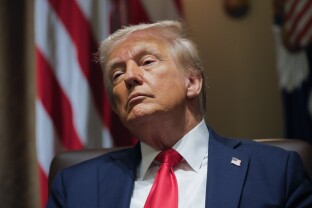The Trump administration increased its aggression against a federal judge on Wednesday, threatening to invoke a “state secrets privilege” to refuse detailing exactly when deportation flights took off from U.S. soil this past weekend — a timeline that could prove whether officials ignored a court order.
President Donald Trump’s decision to invoke the Alien Enemies Act to quickly whisk Venezuelan migrants to a grisly Central American prison — despite a federal judge’s order to halt those planes during the operation — is quickly escalating into a full-blown constitutional crisis pitting the executive branch against the courts.
However, in a new court filing, recent political hires at the Department of Justice tried to reduce the current power showdown into what they called “a picayune dispute over the micromanagement of immaterial fact finding.”
The seven-page legal document showed that the Trump administration is now doing everything it can to create roadblocks to stop U.S. District Judge James E. Boasberg from discovering and making public whether three planes were still in the country when he verbally ordered them to stop on Saturday night.
Attorney General Pam Bondi and her top deputies — all three former personal attorneys to the president himself — were listed in the document, which went as far as to indicate that the Trump administration would want “assurance” that the information wouldn’t reach the American public.
Boasberg has asked for enough information to determine the timeline of events, but the DOJ claims that this granular level of detail “could be catastrophic” to national security and would “unquestionably create serious repercussions for the executive branch’s ability to conduct foreign affairs.”
Drew Ensign, the deputy assistant attorney general on immigration litigation who signed the court papers, accused Boasberg of “a complete misunderstanding of the serious national security, safety, regulatory, and logistical problems presented by a fiat from the court directed at pilots operating outside the United States and was made without regard to whether any such aircraft could feasibly be diverted or even had enough fuel to safely do so.”
In reality, this particular federal judge is no stranger to national security concerns. Not only is he currently the chief judge of the District of Columbia, which normally fields the bulk of sensitive national security cases involving American spy agencies, he’s also overseen proceedings involving concerns with Venezuela. In 2020, at the DOJ’s request during the first Trump administration, he ordered the U.S. seizure of four oil tankers as part of an operation to disrupt petrol shipments from the the Islamic Revolutionary Guard Corps, which the U.S. has labeled a foreign terrorist organization, to Venezuela’s dictatorial regime. At the time, Trump touted his “maximum pressure” campaign to pressure Iran to let go of its nuclear development and told reporters the tankers were “going to Houston.”
Boasberg has also spent the past five years on duty at the Alien Terrorist Removal Court, which Congress authorized in 1996 to hold special proceedings to review the government’s applications to remove people designated “alien terrorists.” (According to the national court system’s Federal Judicial Center, that court has not received an application from the AG as of 2022.)
The Trump administration’s current threat to invoke a “state secrets privilege” to keep the judge from prying further into the matter would dramatically exacerbate the tensions in this case, a point that’s underscored by the DOJ’s own policy severely limiting the use of this legal justification.
Since at least 2009, at a time when the Obama administration faced increasingly public scrutiny over American conduct in its “global war on terror,” the DOJ has maintained a policy that required spy agencies to closely coordinate with the Justice Department for weeks before invoking such a legal tactic.
In 2022, then attorney general Merrick Garland issued a department memo that said “the Department of Justice is committed to ensuring that the United States invokes the state secrets privilege only when genuine and significant harm to national defense or foreign relations is at stake and only to the extent necessary to safeguard those interests.”
The clock is now ticking, as the Trump administration has until noon Thursday to answer five questions under seal directly to the judge. Boasberg wants to know when and where the planes departed “from U.S. soil,” what time they technically left U.S. airspace, when they landed elsewhere, and the circumstances surrounding the transfer of people deemed “alien enemies” to El Salvador. To date, the government hasn’t even stated how many deported Venezuelans fell under Trump’s new legal designation.
Amy Fettig, a human rights lawyer now leading an advocacy group called Fair and Just Prosecution, called the Trump administration’s handling of this matter “a war against the U.S. Constitution.”
“There are mechanisms to deal with national security, and the court is completely able to see things in camera,” she said, referring to the common practice of having lawyers meet with the judge in their chambers to privately reveal sensitive information.
She called the invocation of national security to block the judge “bogus.”
“It’s against the rule of law, separation of powers. We’ve always counted on the rule of law and integrity of the people we elect. We are experiencing a complete lack of integrity and an attempt to destroy democracy as we know it. People need to be in the street,” she said.
—
Jose Pagliery is a reporter at NOTUS.
Sign in
Log into your free account with your email. Don’t have one?
Check your email for a one-time code.
We sent a 4-digit code to . Enter the pin to confirm your account.
New code will be available in 1:00
Let’s try this again.
We encountered an error with the passcode sent to . Please reenter your email.


